
The Berger International Speaker Series hosts lectures on topics relating to international and comparative law by distinguished scholars and practitioners from around the world.
2021 – 2022 Academic Year
Spring 2022
What is Wrong with the Privatization of Education?

Please join us on Thursday, April 14th, 2022 from 12:15 p.m. – 1:15 p.m. for a seminar with Dean Esteban Hoyos of the Universidad EAFIT, held in-person in Room 285 Myron Taylor Hall.
The seminar, entitled “What is Wrong with the Privatization of Education?”, will be moderated by Cornell’s Professor Mitchel Lasser.
Lunch will be provided for attendees.
About the Seminar:
Dean Hoyos will present on his research with Antonio Barboza-Vergara entitled “What is wrong with the privatization of education as anti-poverty policy from a human rights perspective?”. Dean Hoyos’ seminar will present the different models of privatization of education and its relationship with neoliberal doctrine and will focus on the human rights standards in education that deal with private provision of education, and particularly State-funded private provision for people living in poverty. Additionally, he will critically review the question of the compatibility of the private provision of education with a human rights framework. Finally, he will conclude with a research agenda for the fields of human rights, private education and poverty.
About Dean Hoyos:
Professor Hoyos studied law at Universidad de los Andes. He holds a Masters of Law (LL.M) from Cornell Law School in Ithaca, NY. He also holds a J.S.D. degree from Cornell. Before joining EAFIT, Professor Hoyos was a law clerk at the Colombian Constitutional Court. Professor Hoyos has been a full Professor of Law at EAFIT University Law School since 2006.
About Mitchel Lasser:
Mitchel Lasser is the Jack G. Clarke Professor of Law, Director of Graduate Studies, and co-directs the Cornell Summer Institute of International and Comparative Law in Paris. He teaches and writes in the areas of comparative law, law of the European Union, comparative constitutional law, and judicial process.
Walking the Legal Tightrope: The Complexity of Programming US Government Foreign Assistance Amidst Sanctioned Groups or Individuals

Please join us on Tuesday, April 12th, 2022 from 12:15 – 1:15 p.m. for a virtual seminar entitled Walking the Legal Tightrope: The Complexity of Programming US Government Foreign Assistance Amidst Sanctioned Groups or Individuals with David Young, Deputy Mission Director for USAID Pakistan, and Harold Cohen, Assistant General Counsel for Relief, Response, and Resilience at USAID.
About the talk
The US government, through agencies like the US Agency for International Development (USAID), provides billions of dollars in humanitarian and economic assistance to developing countries in furtherance of US national security objectives. This talk will explore the legal challenges and solutions for providing critical support to communities in need that are located in areas where sanctioned groups and individuals, including designated terrorists, are present.
About David Young
As a Foreign Service Officer, David Young has served as a resident legal officer for USAID Missions in Sudan (2009-2011), Ukraine (2012-2014), and Egypt (2017-2021), and as Deputy General Counsel of USAID in Washington (2014-2017). Prior to working at USAID, he served as a legal advisor in the US Congress and a judge advocate in the US Air Force. He is currently a Deputy Director of the USAID Mission in Pakistan. David is a graduate of William and Mary Law School and Amherst College.
About Harold (Hal) Cohen
As the Assistant General Counsel for Relief, Response and Resilience at USAID, Hal Cohen oversees a team of lawyers responsible for providing advice to management and staff of the Bureaus for Humanitarian Assistance, Conflict Prevention and Stabilization and Resilience and Food Security. He is lead counsel on matters related to humanitarian assistance and sanctions. Prior to joining USAID, he served as program counsel at the Federal Emergency Management Agency and, before that, as a public health technical officer at the World Health Organization in Geneva and as a legal officer at the Food and Agriculture Organization of the United Nations in Rome.
Access to Justice for Survivors of Gender-Based Violence – Lessons from the United States

On Thursday, March 24th, 2022 from 12:15 – 1:15 pm we held a virtual seminar with Sandra Park, Senior Staff Attorney in the ACLU Women’s Rights Project, moderated by Cornell’s Professor Elizabeth Brundige.
This talk, entitled Access to Justice for Survivors of Gender-Based Violence – Lessons from the United States, examined current legal barriers to justice for survivors of gender-based violence, including sexual assault and intimate partner violence, and assess national approaches and strategies for advancing survivors’ civil and human rights.
Click here to view the video of the seminar.
About Sandra Park
Sandra Park is a Senior Staff Attorney in the ACLU Women’s Rights Project. At the ACLU, Sandra engages in litigation, policy advocacy, and public education at the federal, state, and local levels to advance gender equality and the rights of women and girls. Sandra has advocated for survivors of gender-based violence throughout her legal career. Much of her current work focuses on discrimination faced by victims of domestic violence and sexual assault in housing, law enforcement response, and schools. She leads the ACLU’s work on fair housing, including challenging the impact of evictions on women of color and housing discrimination against survivors of gender-based violence. Sandra is also responsible for the ACLU’s work strengthening patients’ genetic privacy rights and addressing the intersection of patent regulation and civil liberties. She represented twenty medical organizations, geneticists, and patients in a groundbreaking lawsuit challenging patents granted on two human genes related to breast and ovarian cancer, resulting in a unanimous 2013 U.S. Supreme Court ruling invalidating gene patents (Association for Molecular Pathology v. Myriad Genetics).
Sandra currently serves as Board Chair of Girls for Gender Equity, a Board Member of the New York City Bar Association, and as an Advisory Board Member of the League of Women Voters of the City of New York. She received the 2021 Sharon L. Corbitt Award from the American Bar Association for her exceptional service and leadership to improving the legal response to domestic violence and sexual assault and was selected as a Movement Maker by Move to End Violence, a national initiative to build the social justice movement in the U.S. to end violence against girls and women. Before joining the ACLU, she worked as a Skadden Fellow at the Legal Aid Society of New York and clerked for U.S. District Judge Alvin Hellerstein of the Southern District of New York. She is a magna cum laude graduate of Harvard College and NYU School of Law.
About Elizabeth Brundige
Elizabeth Brundige is a Clinical Professor of Law at Cornell Law School as well as the Assistant Dean for International Programs and Jack G. Clarke Executive Director of International and Comparative Legal Studies. She formerly served as the Executive Director of the Avon Global Center for Women and Justice. Professor Brundige founded and directs the Law School’s Global Gender Justice Clinic, in which students engage in local, global, and transnational efforts to address gender-based violence and discrimination.
Prior to joining Cornell Law School, Professor Brundige was the Robert. M. Cover – Allard K. Lowenstein Fellow in International Human Rights and a clinical lecturer in law at Yale Law School, where she co-taught the Allard K. Lowenstein International Human Rights Clinic. She was previously awarded the Robert L. Bernstein International Human Rights Fellowship to work with the International Association of Women Judges on programs designed to advance women’s human rights and access to justice in southern and East Africa. She was also an Associate Legal Officer in the Appeals Chamber of the International Criminal Tribunal for the Former Yugoslavia and a law clerk for Judge Kermit V. Lipez of the U.S. Court of Appeals for the First Circuit and Justice Sandile Ngcobo of the Constitutional Court of South Africa.
The Start of Trial by Jury in Argentina: Studying a New Jury System at Work in Neuquén, Argentina

On Tuesday, March 15th, 2022 from 12:15 – 1:15 p.m. we held a virtual seminar entitled The Start of Trial by Jury in Argentina: Studying a New Jury System at Work in Neuquén, Argentina with Sidonie Porterie, Vice President of the Latin American Institute for Security and Democracy (ILSED), Aldana Romano, Executive Director of the Institute of Comparative Studies in Criminal and Social Sciences, and Valerie Hans, Charles F. Rechlin Professor of Law at Cornell Law School.
You can view the seminar recording at this link.
About the seminar:
This presentation summarizes the results of a multi-year study of the operation of the new system of trial by jury in the province of Neuquén, Argentina. The province introduced trial by jury to a community with no history of lay participation in legal decision making. Following each trial and with the cooperation of the trial courts, we surveyed jurors, trial judges, prosecutors, private attorneys, and defense attorneys who participated in jury trials in the province, conducted focus groups of jurors, and interviewed judges and lawyers. The project offered a unique opportunity to study the beginnings of a new legal institution and to observe how it is experienced by both lay citizens and by legal professionals. Most jurors had little to no knowledge about the jury system before they were summoned to serve, and few reported great enthusiasm initially. Despite their lack of familiarity with the jury, their experiences as first-time jurors were positive overall. In turn, jurors reported that their involvement as decision makers led them to adopt more favorable views about the jury system, the judiciary, and the courts. Indeed, the experience left many jurors with a sense of pride. Legal professionals also reported generally positive views about the jury trials they participated in, although lawyers reported the need for more training in oral advocacy and trial presentation. The results have both theoretical and applied significance. They can inform scholarly debates in the law and society field about the introduction and success of legal transplants. What is more, insights from the study can be employed in education and training of legal professionals and in policy discussions over jury trial adoption and reform.
About Sidonie Porterie:
Currently, Sidonie Porterie serves as Vice President of the Latin American Institute for Security and Democracy (ILSED). Undersecretary of Political, Parliamentary and Electoral Affairs at the Government of the Province of Buenos Aires (2019-2022). Ex Director of the Institute of Comparative Studies in Criminal and Social Sciences –INECIP- (20). Ex UNDP advisor on justice and security reform for Latin American (PNUD LAC SURF 2005).
Sidonie Porterie is a political scientist (honor diploma) with orientation in State, Administration and Public Policies, and Magister candidate at the Universidad de Buenos Aires. She is a researcher and a consultant on the field of public security, criminal justice, and juries, with experience in many states of Argentina and Latin America.
In the field of jury systems, she is carrying out empirical research in Mendoza, Entre Rios, Neuquén Río Negro and Chaco. She had participated in the parliamentary process of jury laws and she collaborated on the implementation of the new system in Argentinian provinces.
Co-author of the book “The power of the jury” (2018); And Co author of the articles: “El jurado neuquino: el comienzo del jurado clásico en la Argentina (2021); The rise of the jury in Argentina: Evolution in real time” (2021); “Jury trials and self defense” (2019); “Popular jury vs. mixed-jury: a political dilemma” (2017); “From prejudice to experience: jurors from the view of the judicial operators”; “The Jury and its democratic legitimacy: Trial by Jury in Argentina’s public agenda” (2016).
About Aldana Romano:
Aldana Romano currently serves as Executive Director of the Institute of Comparative Studies in Criminal and Social Sciences (From December 2015 – present). External Advisor of the Chamber of Deputies of the Nation, Criminal Law, Security, Justice and Drug Trafficking Committees (2012-2017). External advisor of the Legislature of the City of Buenos Aires on security and justice issues (2018-present). She also teaches at National University Arturo Jauretche (April 2015-today).
Aldana Romano has a Degree in Political Science (Diploma of Honor) at Faculty of Social Sciences, National University of Buenos Aires, and she is a magister candidate at the same university. She is a social researcher at INECIP and she has worked many years on criminal justice, gender, and juries, from civil society positions and also as a legislative assessor.
She is co-director of the empirical research area on jury system, in charge of studies at the province of Neuquen, Rio Negro, Chaco, Entre Ríos and Mendoza. Ad Honorem Researcher of the Public Policy research team, Faculty of Humanities, National University of La Plata, (May 2013- today). Researcher at Gino Germani Institute of the University of Buenos Aires, New Forms of Policies Group (2011-2012).
Co-author of the book “The power of the jury” (2018); And Co author of the articles: “El jurado neuquino: el comienzo del jurado clásico en la Argentina (2021); The rise of the jury in Argentina: Evolution in real time” (2021); “Jury trials and self defense” (2019); “Popular jury vs. mixed-jury: a political dilemma” (2017); “From prejudice to experience: jurors from the view of the judicial operators”; “The Jury and its democratic legitimacy: Trial by Jury in Argentina’s public agenda” (2016).
About Valerie Hans:
Valerie P. Hans, Charles F. Rechlin Professor of Law, conducts empirical studies of law and the courts, and is one of the nation’s leading authorities on the jury system. Trained as a social scientist, she has carried out extensive research and lectured around the globe on juries and jury reforms as well as the uses of social science in law.
She is the author or editor of 9 books and over 150 research articles. Current projects on the American jury include developing a new theory of damage awards, analyzing how jury service promotes civic engagement, and examining the impact of race in tort decisions. Professor Hans is also studying the diverse forms of citizen participation in legal decision making in other countries. Her research and that of others are summarized in a coedited book, Juries, Lay Judges, and Mixed Courts: A Global Perspective (2021). Other books include: The Psychology of Tort Law (2016); American Juries: The Verdict (2007); The Jury System: Contemporary Scholarship (2006); Business on Trial: The Civil Jury and Corporate Responsibility (2000); and Judging the Jury (1986).
A Panel on Law and Mobility from a European Context

Follow this link to see the recording of the event!
On Tuesday, March 8th, 2022 from 12:15 pm – 1:15 pm we held a virtual panel featuring Rozen Noguellou, State Councillor in France’s Conseil d’État, and David Renders, Professor at the University of Louvain and Lawyer at the Bar of Brussels. Ms Noguellou and Mr Renders are co-authors of 2018’s Uber & Taxis: Comparative Law Studies.
The panel was moderated by Cornell’s Professor Sara Bronin and featured the panelists’ comparative studies regarding law and mobility in a European context.
About the panel:
David Renders – Catching a Ride in the European Capital
In Brussels, the emergence of UBER has been a source of confusion, both in law and in fact. As elsewhere, this new service arrived very suddenly. As a result, it seriously undermined the existing regulatory framework in Belgium’s capital, which until then had been designed to allow only cabs and luxury cabs. Outraged by the arrival of a competitor that, in its view, brazenly violated the law applicable in Brussels, the cab industry lobbied intensively and, at the same time, took legal action to prevent UBER from continuing to operate. In two rulings issued at the end of November 2021, the courts ruled in favor of the cabs, which led UBER to cease its activity for a few days. The political class immediately seized the issue to conclude, in a hurry, an agreement replacing the legal framework applicable until then in the Belgian and European capital with a new framework, but only temporarily. Which framework should apply? And why? Moreover, is the newly instituted framework really only temporary? Of all the urban mobility issues in Brussels, UBER is by far the hottest and most unfinished. It’s an example of the law trying to balance the weight of the past and the horizons of the future.
Rozen Noguellou – Regulating New Mobilities: the Parisian Case
Mobility has been profoundly transformed in Paris in the last decade. Environmental considerations were imposed to limit the use of cars, new transportation models emerged, and the law had to adapt. Since transportation is crucial to the development of cities, the way Paris is adapting to new mobilities raises the question of its future.
About Rozen Noguellou:
Rozen Noguellou has been a State Councillor since 2020. She previously was a Law Professor at the University Paris 1 – Pantheon Sorbonne (Sorbonne Law School), where she used to teach land use and planning law, public contracts law and regulation. She was appointed at the Council of State (France’s administrative supreme court) in 2020 where she mostly works on environmental and planning law cases.
She has published papers in various French law journals and taken part in collective works in France and abroad. She is the co-author of a textbook on Planning and Construction Law (2020, LGDJ), the co-author of a textbook on Public Property Law (2018, Dalloz) She also co-edited a book on “Comparative law on public contracts” (2010, Bruylant) and a book on “Uber and taxis, a comparative law study” (2018, Bruylant).
She teaches or takes part in conferences in various universities throughout the world.
About David Renders:
David Renders is a Lawyer at the Bar of Brussels and full professor at the Université Catholique de Louvain School of Law where he is currently Vice Dean and Director of the Centre Montesquieu d’études de l’action publique. He is the author or the co-author of over two hundred and fifty books and contributions. He teaches General Administrative Law, Administrative Litigation, Public Policy Law, and Administrative Law related to the European Integration. He has been a Visiting Scholar at Cambridge University, a Visiting Professor at the Universities of Bordeaux, Brescia, Fukuoka, Limoges, Paris I-Pantheon Sorbonne, Sao Paolo and Södertörn, a Lecturer in various other locations both in Europe and the United States, Secretary-General of the International Association for Urban Planning Law, and a Trainee at the General Court of the European Union. He also has been consulted as an expert by Belgian federal and federated Parliaments and Government Members. Mr. Renders serves on several editorial boards of Belgian and French scientific journals, has been a member of numerous examination boards including that of the Auditors for the Belgian Council of State and that of the University Institute of France, and was called to serve on several Belgian Public Institutions.
About Sara Bronin:
Sara Bronin is a Professor at the Cornell School of Art, Architecture, and Planning, an Associate Member of the Cornell Law School Faculty, and a Faculty Fellow of the Cornell Atkinson Center for Sustainability. Her interdisciplinary research focuses on how law and policy can foster more equitable, sustainable, well-designed, and connected places.
In addition to her books and treatises on land use and historic preservation law, she has written over two dozen articles on renewable energy, climate change, housing, urban planning, transportation, real estate development, and federalism. She also serves as the lead author of the land use volume of the forthcoming Restatement (Fourth) of Property. Among other current projects, Bronin leads the research team behind the Connecticut Zoning Atlas, the first interactive GIS map of all of the zoning regulations in a single state. Her book, Key to the City, under contract with W.W. Norton Press, will explore how zoning shapes our lives.
Banking Bailout Law: A Comparative Study of the United States, United Kingdom and the European Union

Please click here to view the recording of this event!
On Tuesday, March 1st, 2022 from 12:15 pm to 1:15 pm we held a virtual book talk with Dr. Virág Blazsek, Lecturer in Commercial, Corporate and Banking Law at the University of Leeds School of Law and author of Banking Bailout Law: A Comparative Study of the United States, United Kingdom and the European Union.

The talk was moderated by Professor Alison Shea, Research & Instructional Librarian (Foreign, Comparative & International Law) at Cornell Law School.
About the book:
Setting forth the building blocks of banking bailout law, this book reconstructs a regulatory framework that might better serve countries during future crisis situations. It builds upon recent, carefully selected case studies from the U.S., the EU, the U.K., Spain, and Hungary to answer the questions of what went wrong with the bank bailouts in the EU, why the U.S. performed better in terms of crisis management, and how bailouts could be regulated and conducted more successfully in the future. Employing a comparative methodology, it examines the different bailout and bank resolution techniques and tools and identifies the pros and cons of the different legal and regulatory options and their underlying principles. In the post-2008 legal-regulatory architecture financial institution specific insolvency proceedings were further developed or implemented on both sides of the Atlantic. Ten years after the most recent financial crisis, there is sufficient empirical evidence to evaluate the outcomes of the bank bailouts in the U.S. and the EU and to examine a number of cases under the EU’s new bank resolution regime.
About our speaker:
Dr. Virág Blazsek is a Lecturer in Commercial, Corporate and Banking Law at the University of Leeds School of Law. Dr. Blazsek received a Juris Doctor degree from the Eötvös Loránd University, LLM and PhD degrees in International Business Law from the Central European University and an LLM in U.S. and Global Business Law from Suffolk University School of Law, Boston, MA. She also earned an LLM in Business and Finance Law from the George Washington Law School in Washington, D.C. where she served as a Thomas Buergenthal Scholar. Dr. Blazsek’s scholarship is focused on financial stability-related legal, regulatory and policy issues from a comparative perspective. She is the author of the book “Banking Bailout Law: A Comparative Study of the United States, United Kingdom and the European Union” (Routledge U.S. & U.K., 2020). Dr. Blazsek has previously been a visiting researcher, visiting scholar, and visiting lecturer at Fordham University School of Law, Columbia Law School, and Budapest Business School. Earlier, she practiced for a decade as an attorney at OTP Bank Plc’s Legal Directorate in Budapest and at the Office of Investment Management of the United Nations Joint Staff Pension Fund in New York City.
About our moderator:
Alison Shea is currently Research & Instructional Law Librarian (Foreign, Comparative & International Law) and teaches both introductory and advanced legal research courses (including Foreign, Comparative & International Legal Research) to J.D. and L.L.M. students. Alison enjoys providing research assistance and instruction in all areas of the law, but her specialties include the European Union, British and Irish law, arbitration, and international economic law. Before moving to Cornell in 2018, she was the Head of Reference/Foreign & International Specialist and Adjunct Professor of Law at Fordham Law School. Alison graduated with a B.A. from Boston University (2004), and a joint J.D./M.S.L.S. from The Catholic University of America (2007).
Siege Starvation: A War Crime of Societal Torture

On Tuesday, February 22nd, 2022 we held a virtual talk with Professor Tom Dannenbaum entitled Siege Starvation: A War Crime of Societal Torture.
The talk was moderated by Professor Brian Richardson.
About the seminar:
A recent amendment to the Statute of the International Criminal Court has drawn unprecedented attention to the war crime of starvation of civilians as a method of warfare. It comes at a time when mass starvation in war is resurgent, devastating populations in Yemen, Ethiopia, Syria, South Sudan, Nigeria, and elsewhere. The practice has also drawn the scrutiny of the United Nations Security Council. And yet, despite this heightened profile and sharpened urgency, what precisely is criminally wrongful about starvation methods remains underspecified.
A common way of thinking about the criminal wrong is as a form of killing or harming civilians. Although its differentiating particularities matter, the basic wrongfulness of the crime inheres, on this view, in it being an attack on those who ought not be attacked. For some, this supports a broad interpretation of the starvation ban. However, for others, the graduality of starvation preserves the continuous possibility of the avoidance or minimization of civilian death or harm in a way that direct kinetic attacks do not. In combination with the method’s purported military utility, this distinctive incrementalism has underpinned arguments for the permissibility of certain forms of siege and other deprivation and a narrow interpretation of the starvation crime.
Drawing on the moral philosophy of torture, this Article offers a different normative theory of the crime. Starvation, like torture, is peculiarly wrongful in its distortion of victims’ biological imperatives against their capacities to formulate and act on higher-order desires, political commitments, and even love. This process does not merely raise the cost of fulfilling those commitments. Instead, starvation tears gradually at the very capacity of those affected to prioritize their most fundamental commitments, regardless of whether they would choose to do so under the conditions necessary to evaluate matters with a “contemplative attitude.”Rather than palliating, the slowness of starvation methods is at the crux of this torturous wrong. Recognizing this redefines the meaning and place of the crime in the framework of international criminal law.
About Professor Dannenbaum:
Tom Dannenbaum is Assistant Professor of International Law at the Fletcher School of Law & Diplomacy, Tufts University. He writes on the law of armed conflict, the law on the use of force, international criminal law, human rights, shared responsibility, and international judging. His work has been published in a range of leading journals, including the Yale Law Journal, the European Journal of International Law, International & Comparative Law Quarterly, International Law Studies, the Harvard International Law Journal, the Chicago Journal of International Law, the Cornell International Law Journal, and Security Studies. His book, The Crime of Aggression, Humanity, and the Soldier, was published by Cambridge University Press in 2018. His work on aggression was awarded the Lieber Prize by the American Society of International Law in 2017. Prior to joining Fletcher, he taught at University College London and Yale Law School.
About Professor Brian Richardson:
Brian Richardson is an Assistant Professor of Law and the Jia Jonathan Zhu & Ruyin Ruby Ye Sesquicentennial Faculty Fellow at Cornell Law School. His research and teaching interests include international law, constitutional law, and criminal law. Prior to joining Cornell, Richardson was an Assistant Special Counsel for Robert S. Mueller III. He also clerked for Judge Jed S. Rakoff of the United States District Court for the Southern District of New York, Chief Judge Robert A. Katzmann of the United States Court of Appeals for the Second Circuit, and Justice Stephen G. Breyer of the Supreme Court of the United States.
Tyrants on Twitter: Protecting Democracies from Information Warfare

Please join us on Wednesday, February 16th, 2022 at 12:15 p.m. for a virtual seminar with David L. Sloss entitled Tyrants on Twitter: Protecting Democracies from Information Warfare, based on his book of the same name.
Mr. Sloss will be introduced by Dean Jens Ohlin.
About the seminar:
When Facebook, Twitter, YouTube, and Instagram were first introduced to the public, their mission was simple: they were designed to help people become more connected to each other. Social media became a thriving digital space by giving its users the freedom to share whatever they wanted with their friends and followers. Unfortunately, these same digital tools are also easy to manipulate. As exemplified by Russia’s interference in the 2016 U.S. presidential election, authoritarian states can exploit social media to interfere with democratic governance in open societies.
Tyrants on Twitter is the first detailed analysis of how Chinese and Russian agents weaponize Facebook, Instagram, Twitter, and YouTube to subvert the liberal international order. In addition to examining the 2016 U.S. election, David L. Sloss explores Russia’s use of foreign influence operations to threaten democracies in Europe, as well as China’s use of social media and other digital tools to meddle in Western democracies and buttress autocratic rulers around the world.
Sloss calls for cooperation among democratic governments to create a new transnational system for regulating social media to protect Western democracies from information warfare. Drawing on his professional experience as an arms control negotiator, he outlines a novel system of transnational governance that Western democracies can enforce by harmonizing their domestic regulations. And drawing on his academic expertise in constitutional law, he explains why that system—if implemented by legislation in the United States—would be constitutionally defensible, despite likely First Amendment objections. This book is essential reading in a time when disinformation campaigns threaten to undermine democracy.
About David L. Sloss:
David L. Sloss is the John A. and Elizabeth H. Sutro Professor of Law at Santa Clara University. He is the author of The Death of Treaty Supremacy: An Invisible Constitutional Change (Oxford Univ. Press, 2016) and Tyrants on Twitter: Protecting Democracies from Information Warfare (Stanford Univ. Press, forthcoming 2022). He is the co-editor of International Law in the U.S. Supreme Court: Continuity and Change (Cambridge Univ. Press, 2011) and sole editor of The Role of Domestic Courts in Treaty Enforcement: A Comparative Study (Cambridge Univ. Press, 2009). He has also published several dozen book chapters and law review articles. His book on the death of treaty supremacy and his edited volume on international law in the U.S. Supreme Court both won prestigious book awards from the American Society of International Law. Professor Sloss is a member of the American Law Institute and a Counsellor to the American Society of International Law. His scholarship is informed by extensive government experience. Before entering academia, he spent nine years in the federal government, where he worked on U.S.-Soviet arms control negotiations and nuclear proliferation issues.
About Dean Jens Ohlin:
Jens Ohlin became the Allan R. Tessler Dean on July 1, 2021. He previously served as Interim Dean (January-June 2021), Vice Dean (2017-2020), Associate Dean for Academic Affairs (2015-2017), and Director of Faculty Research (2013-2015).
His scholarly work stands at the intersection of four related fields: criminal law, criminal procedure, public international law, and the laws of war. Trained as both a lawyer and a philosopher, his research has tackled questions as diverse as criminal conspiracy and the punishment of collective criminal action, the philosophical foundations of international law, and the role of new technologies in warfare, including cyberwar, remotely piloted drones, and autonomous weapons.
Fall 2021
Refugee Resettlement and Immigration Solutions after the U.S. Withdrawal from Afghanistan
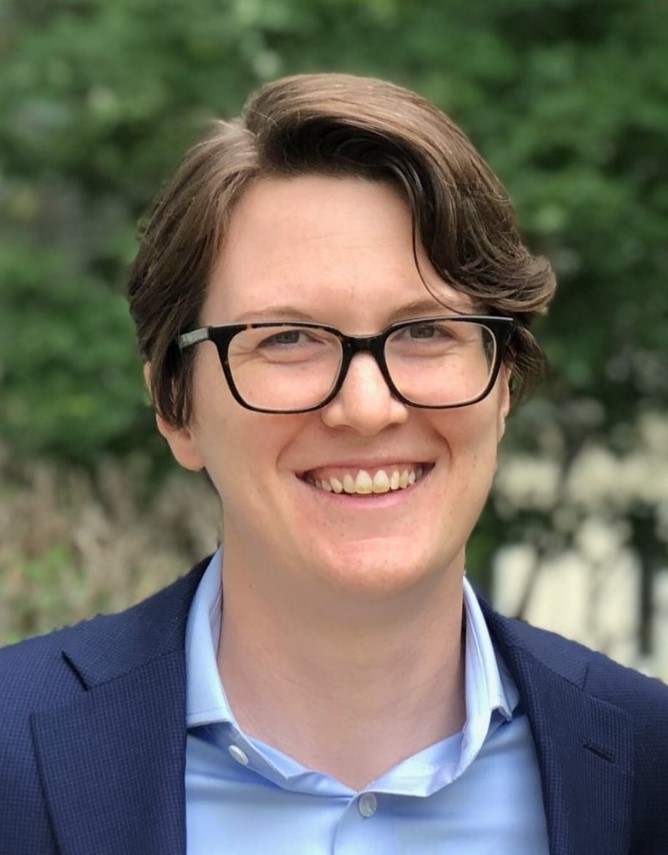
This talk, entitled “Refugee Resettlement and Immigration Solutions after the U.S. Withdrawal from Afghanistan”, was held on September 28, 2021 and moderated by Professor Jaclyn Kelley-Widmer. It can be viewed here: https://vod.video.cornell.edu/media/Berger+International+Speaker+Series+with+Betsy+FisherA+Refugee+Resettlement+and+Immigration+Solutions+after+the+U.S.+Withdrawal+from+Afghanistan/1_nmzszlzr
About the talk:
Afghan refugees have long comprised the largest or second-largest group of refugees in the world, and the number of Afghans seeking safety outside Afghanistan increased dramatically even before the U.S. government’s chaotic withdrawal from Afghanistan.
Betsy Fisher, Director of Strategy at International Refugee Assistance Project (IRAP), will discuss why U.S. immigration programs and international refugee protection systems failed to achieve their goals, and policy solutions to improve them.
About our featured guest:
Betsy Fisher is the Director of Strategy at the International Refugee Assistance Project (IRAP). She coordinates IRAP’s efforts to screen potential clients, represent refugees in UNHCR proceedings, and provide self-help materials to refugees and displaced people. She previously served as IRAP’s policy director, Jordan staff attorney and intake coordinator based in Amman, Jordan. Betsy has published op-eds and academic articles about statelessness and refugee resettlement in publications like the New York Times and the Michigan Law Review.
Betsy is a graduate of the University of Michigan Law School, the Center for Middle Eastern and North African Studies at the University of Michigan Rackham Graduate School, and Denison University.
Finding Accountability in the Mirror: Helping Vulnerable Populations Enforce Their Human Rights Against Powerful Countries and Institutions
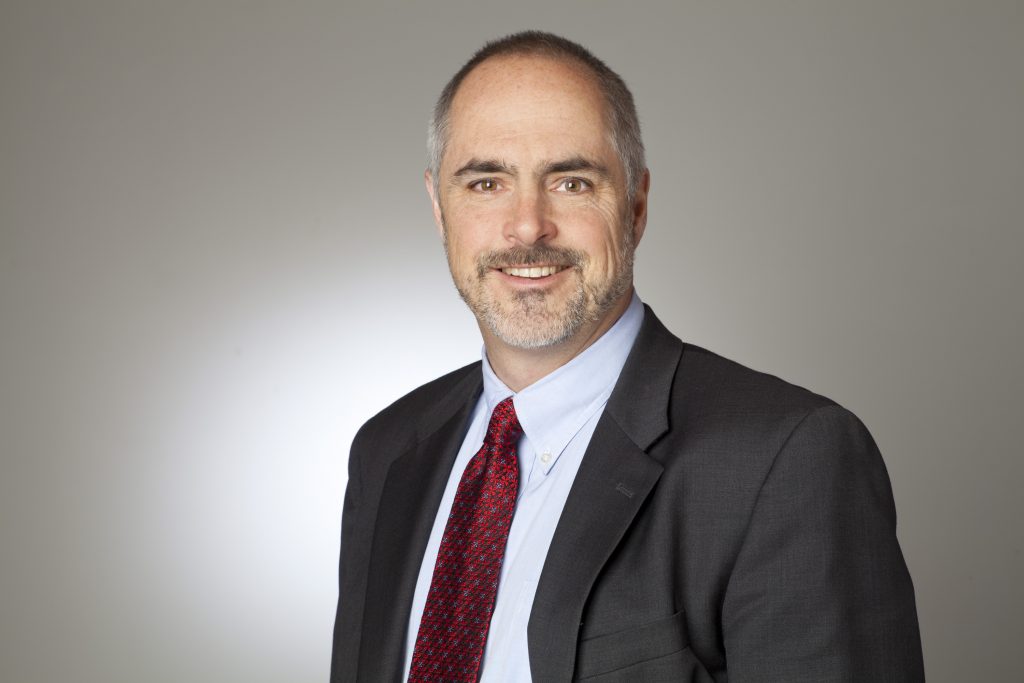
On Tuesday, October 12, 2021 from 12:15 p.m. to 1:15 p.m. we held a virtual Zoom conversation with Brian Concannon, Executive Director at Project Blueprint.
The talk, entitled “Finding Accountability in the Mirror: Helping Vulnerable Populations Enforce Their Human Rights Against Powerful Countries and Institutions”, was moderated by Professor Kathy Bergin.
Here is a link to the recording of our conversation with Brian Concannon: https://vod.video.cornell.edu/media/t/1_ewlbu0av
Brian Concannon is Executive Director of Project Blueprint, which promotes a progressive, human rights-based US foreign policy by bringing the perspectives of people impacted by US actions abroad into policy discussions. Brian is a Board Member of the Institute for Justice & Democracy in Haiti (IJDH), and was its founder and Executive Director from 2004-2019. He lived in Haiti from 1995 to 2004, where he served as a Human Rights Officer with the United Nations and Co-Managing Attorney with the Bureau des Avocats Internationaux, a public interest law firm.
Documenting the Resistance to Israel’s Occupations Amid an Escalating Campaign to Silence Dissent: The Work of the International Human Rights Clinic
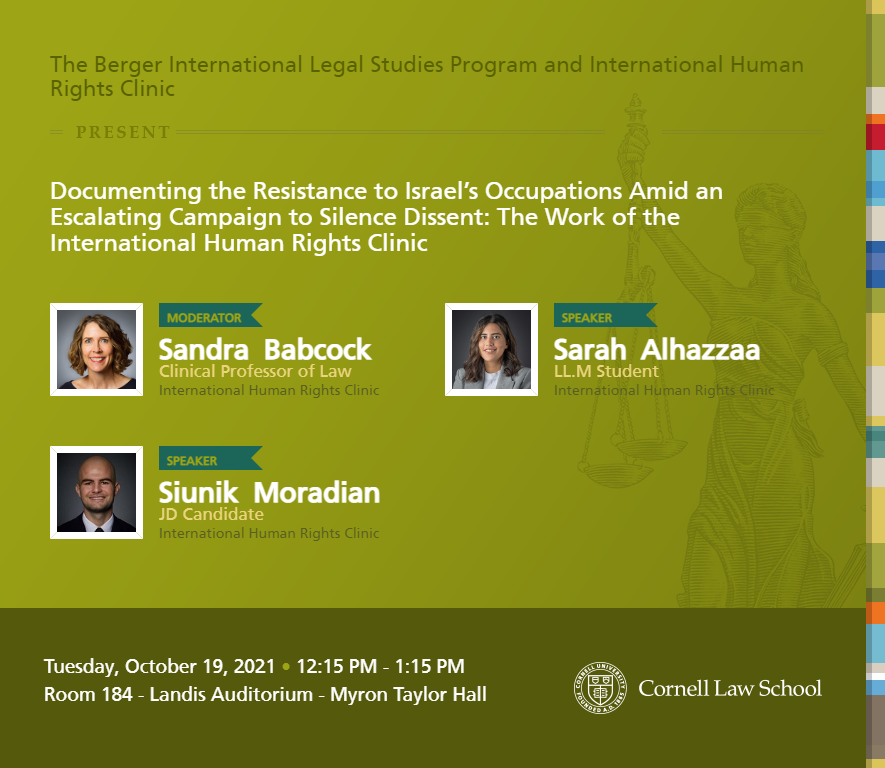
Please join us on Tuesday, October 19th, 2021 from 12:15 p.m. to 1:15 p.m. in the Landis Auditorium (Room 184) for a Berger International Speaker Series seminar led by Professor Sandra Babcock entitled “Documenting the Resistance to Israel’s Occupations Amid an Escalating Campaign to Silence Dissent: The Work of the International Human Rights Clinic”.
The talk will feature presentations by Sarah Alhazzaa, LL.M. student, and Siunik Moradian, JD Candidate, both of whom have contributed to the International Human Rights Clinic.
About our speakers:
Siunik Moradian is a 3L in the International Human Right Law Clinic. Siunik is currently in his third semester with the Clinic, working on capital cases in both the US and Tanzania as well as his current work around Israel’s illegal occupation of the Golan Heights.
Sarah Alhazzaa is an LL.M student and part of the International Human Rights Clinic.
Professor Sandra Babcock specializes in international human rights litigation, access to justice, death penalty defense, international gender rights, and the application of international law in US courts.
Professor Babcock is the faculty director of the Cornell Center on the Death Penalty Worldwide. Through her clinical teaching, she has spent several years working on access to justice for prisoners in Malawi, where her advocacy has led to the release of more than 250 prisoners-140 of whom were previously sentenced to death. She was the principal architect of the Malawi Resentencing Project, which won the World Justice Challenge in April 2019 in The Hague.
She is also counsel to the Government of Mexico in the cases of Mexican nationals facing the death penalty in the United States, and was Mexico’s counsel before the International Court of Justice in Avena and Other Mexican Nationals. For her work, she was awarded the Aguila Azteca, the highest honor bestowed by the government of Mexico upon citizens of foreign countries, in 2003.
Professor Babcock has argued cases before the International Court of Justice, the Inter-American Court on Human Rights, the Inter-American Commission on Human Rights, the U.S. Court of Appeals for the Fifth Circuit, and the Supreme Courts of California, Texas, Minnesota, and New Mexico.
In addition to her clinical teaching, she teaches doctrinal courses on International Human Rights, International Women and Children’s Rights, and International Law and the Death Penalty. She spent the fall semester 2014 as the Fulbright-Toqueville Distinguished Chair at the Université de Caen, Basse-Normandie, teaching a seminar on international gender rights as well as an international human rights clinic.
The Palace Politics of “Precarious” Sovereignty: Afghan State-building in the Shadow of Counterterrorism
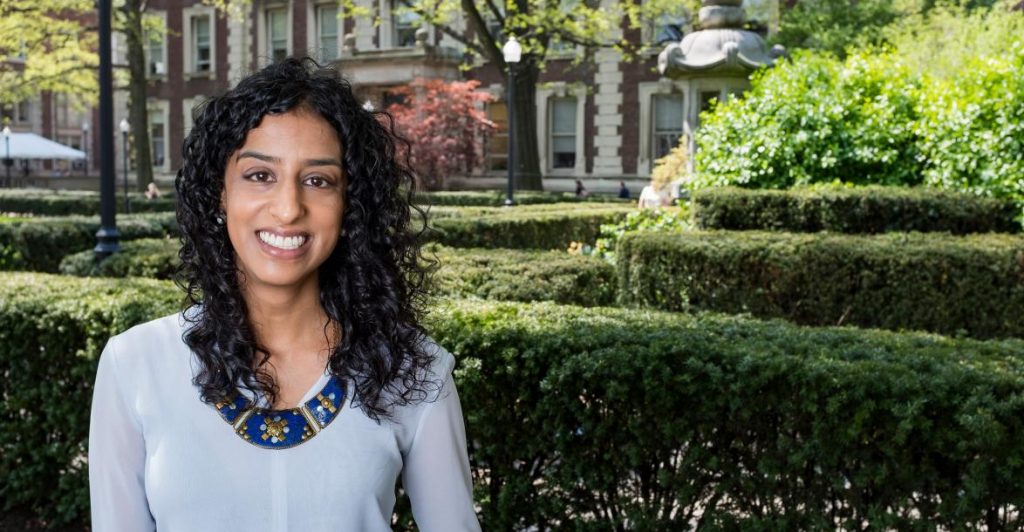
You are invited to join us for a lunchtime discussion on Tuesday, November 2, 2021 from 12:15 to 1:15 p.m. in Room 184 – Landis Auditorium – Myron Taylor Hall with Dr. Dipali Mukhopadhyay, Associate Professor in the Global Policy Area at the University of Minnesota’s Humphrey School of Public Affairs.
Dr. Mukhopadhyay will present her talk entitled “The Palace Politics of ‘Precarious’ Sovereignty: Afghan State-building in the Shadow of Counterterrorism” and Professor Avani Mehta Sood, Visiting Professor of Law at Cornell University, will moderate the event.
Sandwich coupons for Copper Horse Coffee in the Law School Commons will be distributed to attendees.
About the Seminar:
The Palace Politics of “Precarious” Sovereignty: Afghan State-building in the Shadow of Counterterrorism
Since September 11, 2001, the United States and its allies have involved themselves in matters of governance abroad, not out of an altruistic commitment to the spread of liberal democracy, but, rather, as a function of concerns about the presumed nexus between weak statehood and globalized violent extremism. Those campaigns – of which Afghanistan is the paradigmatic case – have proved profoundly challenging, their failings often ascribed to the weakness and corruption of new regimes meant to usher in stability, democratic politics, and liberal governance. I employ the case of the post-2001 Afghan government, the first object of intervention in the so-called war on terror, to challenge this near-axiomatic characterization. I argue that state-building in the shadow of counterterrorism is an unprecedentedly constricting form of intervention in which a regime’s venality is not a bug but, rather, a feature that stems from the exceptional limits interveners place on the very regime they claim to embolden. The recent calamitous withdrawal of the last of U.S. forces from Afghanistan – and its aftermath – can be understood as a function of this neo-imperial form of intervention as well.
About our Speaker:
Dipali Mukhopadhyay is Associate Professor in the global policy area at the Humphrey School of Public Affairs at the University of Minnesota. Her research focuses on the relationships between political violence, state building, and governance during and after war. She is currently serving as senior expert on Afghanistan for the U.S. Institute of Peace and is an affiliated scholar with Columbia University’s Saltzman Institute of War and Peace Studies. She is also the Vice President of the American Institute for Afghanistan Studies. Mukhopadhyay is the author of Good Rebel Governance: Revolutionary Politics and Western Intervention in Syria (Cambridge University Press, forthcoming) with Kimberly Howe, and Warlords, Strongman Governors and State Building in Afghanistan (Cambridge University Press, 2014).
2020-2021 Academic Year
Spring 2021
International Law and Peacemaking
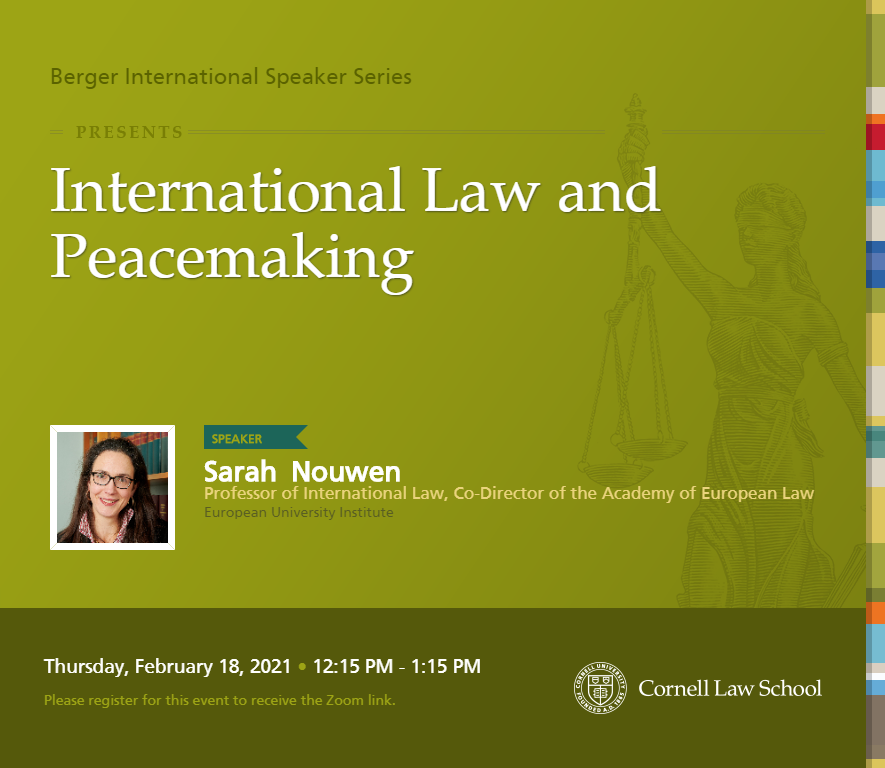
Speaker: Sarah Nouwen
Date and Time: February 18, 2021 12:15 PM – 1:15 PM
Sarah Nouwen is a Professor of International Law at the European University Institute in Florence, where she is also a Co-Director of the Academy of European Law. She is on leave from the University of Cambridge, where she served for several years as Co-Deputy Director of the Lauterpacht Centre for International Law, and from Pembroke College. She is currently an Editor-in- Chief of the European Journal of International Law.
Her research interests lie on the intersections of law and politics, war and peace and justice and the rule of law. Building on her experience in diplomacy and peace negotiations, her research focuses on how international law plays out in concrete situations. It combines doctrinal analysis and theory with empirical research and draws on law, politics, and anthropology.
Prior to joining the Cambridge Law Faculty, Sarah worked for the Netherlands Ministry of Foreign Affairs in New York, The Hague and Khartoum. In 2010-2011 she served as Senior Legal Advisor to the African Union High-Level Implementation Panel in Sudan, consisting of three former Presidents who played a key role in the negotiations on an independent South Sudan and in seeking resolutions for the conflict in Darfur.
She holds an LLB and LLM (Utrecht University, with specialisations done in at the University of Cape Town and the University of the Western Cape), an MPhil in International Relations (Cantab) and a PhD in Law (Cantab) and is the author of the CUP monograph Complementarity in the Line of Fire: The Catalysing Effect of the International Criminal Court in Uganda and Sudan. Her article `“As You Set out for Ithaka”: Practical, Epistemological, Ethical, and Existential Questions about Socio-Legal Empirical Research in Conflict’ was awarded with the Leiden Journal of International Law Prize.
International Refugee Norms and Their Implementation in the United States
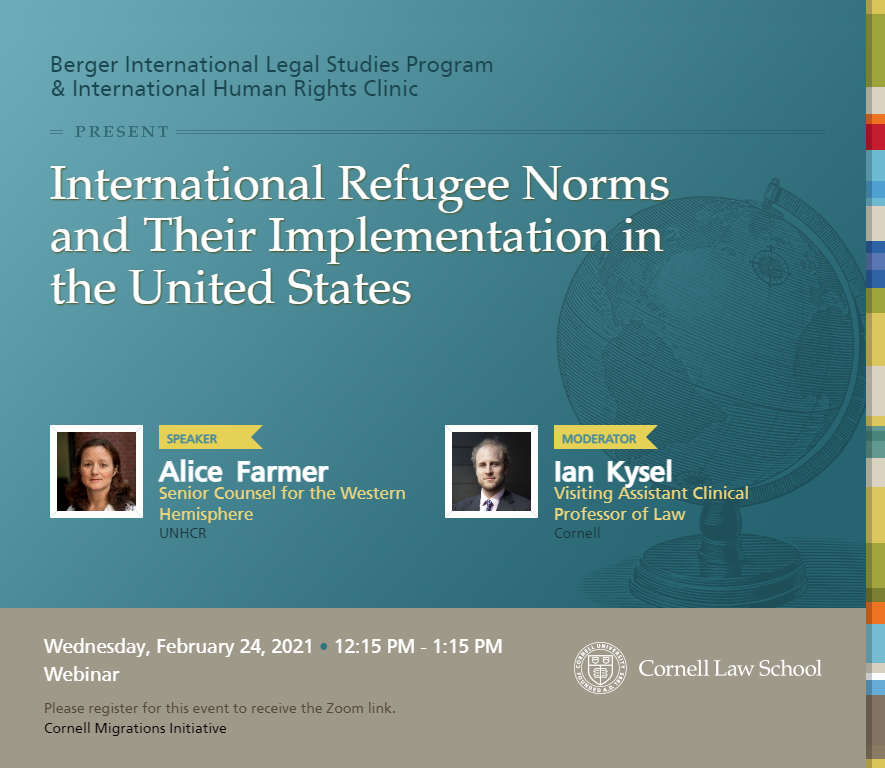
Speaker: Alice Farmer
Watch a video recording of this Webinar here (no login required), or view at Cornell Video on Demand here (login required)!
Date and time: Wednesday, February 24, 2021 at 12:15pm to 1:15pm
Alice Farmer is the Legal Officer for UNHCR’s Washington D.C. office. The office serves as a resource to policymakers in drafting and implementing refugee protection measures; monitors U.S. compliance with international standards; and assists asylum-seekers and their representatives in presenting claims. Ms. Farmer oversees strategic litigation and judicial engagement, directs programming on children in the U.S., and works to ensure due process and access to counsel for asylum-seekers. Previously, Ms. Farmer served as the protection officer in the Washington office.
Prior to joining the Washington office, Ms. Farmer worked on refugee and human rights issues in various capacities for Human Rights Watch, the American Civil Liberties Union, and the Norwegian Refugee Council, as well as in other offices of UNHCR. Ms. Farmer has researched and published on the human rights of children in displacement in more than twelve countries. Ms. Farmer, in her capacity at Human Rights Watch, created and led the organization’s global campaign against immigration detention of children.
Ms. Farmer started her legal career with the U.S. Department of Justice Honors Program, in the Executive Office for Immigration Review. She has lectured on human rights at Harvard Law School, Georgetown University Law Center, and the Institut d’études politiques de Paris (Sciences Po), and published with Oxford’s Forced Migration Review, the Georgetown Immigration Law Journal, the Yale Human Rights and Development Law Journal, among others. Ms. Farmer holds a J.D. from New York University School of Law, a master’s degree in public administration from Harvard’s Kennedy School, and a bachelor’s degree from Harvard College.
Using the Jury to Spread Democratic Reform in Argentina and Beyond
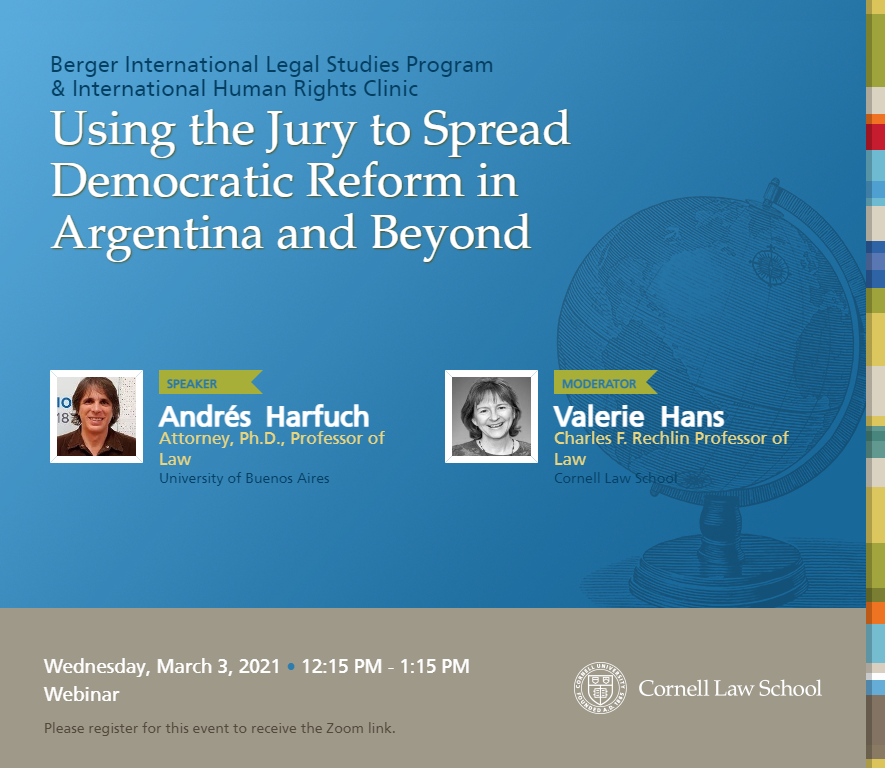
Speaker: Andrés Harfuch, University of Buenos Aires
Moderator: Valerie Hans
Watch a video recording of this Webinar here (no login required), or view at Cornell Video on Demand here (login required)!
Andrés Harfuch is a public defender and Associate Professor of Law at the University of Buenos Aires, where he regularly teaches the next generation of Argentine lawyers about trial litigation. He is also a Member of the Board of Directors of INECIP, the Institute for Comparative Studies in Political and Social Sciences, in Buenos Aires, and Vice-president of the Argentine Association for Trial by Jury (AAJJ). Andrés leads a group of remarkably successful activists in Argentina dedicated to the improvement of the justice system. One impressive success has the promulgation of trial by jury in criminal cases in six provinces in Argentina, and most recently trial by jury in civil cases in Chaco. He has written many books and articles about criminal procedure and jury trial procedure that are widely consulted by judges and lawyers in Argentina. He was a Visiting Scholar at Cornell Law School in 2014.
Reproductive Justice, Human Rights and Transformative Constitutionalism
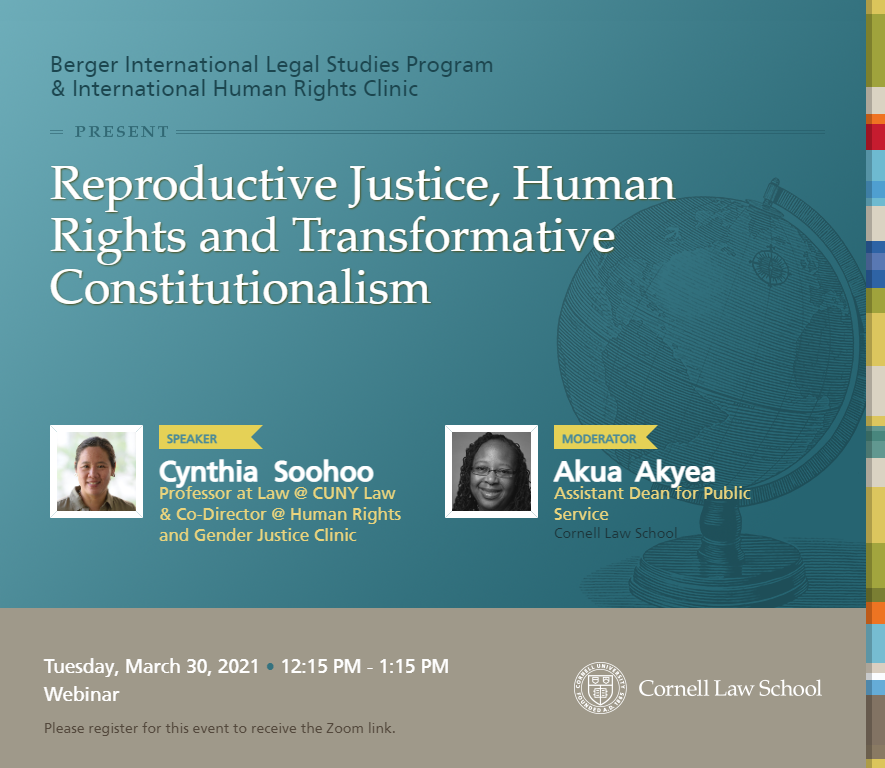
Speaker: Cynthia Soohoo
Moderator: Akua Akyea
Around the world, people have fought for control over their bodies and the ability to make reproductive and parenting choices, free from external control and coercion. Reproductive oppression violates basic human rights to make decisions about one’s body, life, and future and, if one chooses, to have, parent, and nurture children. Historically, reproductive oppression has taken many forms including forced sterilization and criminalization of contraceptive use and abortion, but at bottom, it involves the instrumentalization of a person’s reproductive capacity to serve the goals of others.
The reproductive justice movement, founded by Black women in the United States in the 1990s, provides an important framework to understand how and why reproductive oppression has impacted different communities and the ways in which U.S. law has failed to recognize and remedy the harm. The lecture will consider different forms of reproductive oppression and theorize alternative legal approaches drawing on human rights and comparative law.
Cynthia Soohoo is a Professor at Law at CUNY Law and Co-Director of the Human Rights and Gender Justice Clinic. Professor Soohoo is an author and frequent commentator on women’s human rights, the rights of youth in detention, and human rights advocacy in the United States. She has authored submissions to the U.S. Supreme Court, appellate courts and international forums on access to abortion, forced sterilization and criminalization of reproductive choices. She co-edited BRINGING HUMAN RIGHTS HOME, a three-volume book on human rights in the United States, which received the 2008 Gustavus Myers Outstanding Book Award. She is a co-editor of the Reproductive Rights Professor Blog and frequent contributor to the Bringing Human Rights Home Law Professor Blog. From 2008-2011, Professor Soohoo was the Director of the U.S. Legal Program at the Center for Reproductive Rights. From 2001-2007, she served as Director of the Bringing Human Rights Home Project, Human Rights Institute, Columbia Law School, and a supervising attorney for the law school’s Human Rights Clinic.
A Fresh Focus on the U.S./Mexico Border: Protection of Unaccompanied Children Grounded in Systemic Reforms
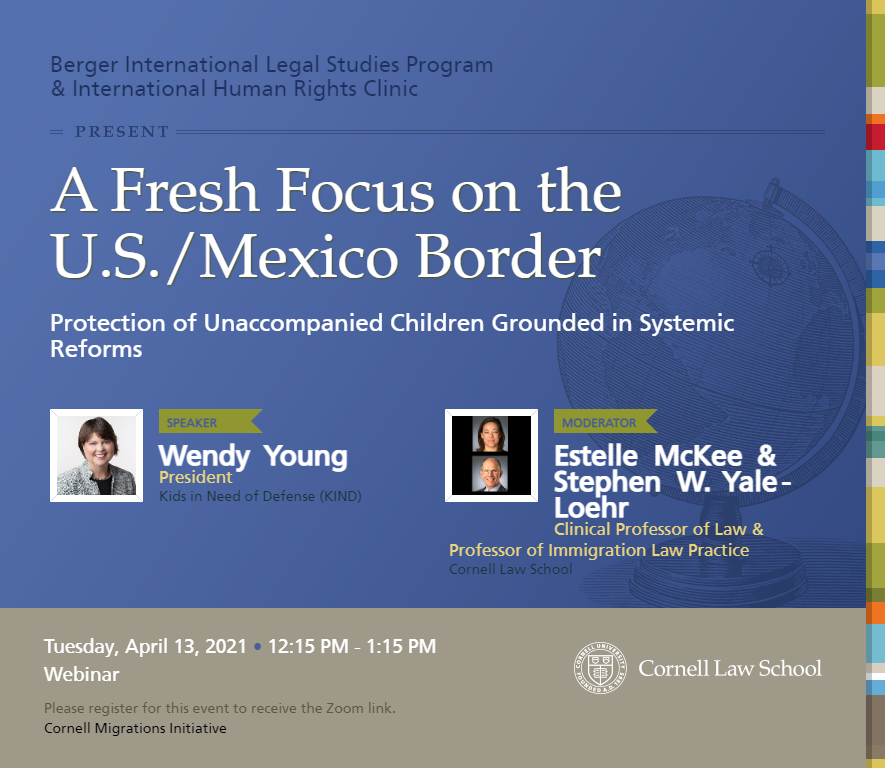
Click here to watch this Webinar on Cornell On Demand!
Speaker: Wendy Young
Date and Time: April 13, 2021 12:15 PM – 1:15 PM
Wendy has led KIND since 2009, and brings extensive immigration policy experience to the organization. Prior to KIND, she served as Chief Counsel on Immigration Policy in the Senate Judiciary Subcommittee on Immigration, Border Security and Refugees for Senator Edward M. Kennedy. She held prior immigration policy positions with organizations such as the United Nations High Commissioner for Refugees, the Women’s Refugee Commission, the United States Conference of Catholic Bishops, and the National Council of La Raza. She has also written numerous articles, reports and cutting-edge op-eds on the plight of unaccompanied children. Wendy has received a number of awards and honors for her work on immigration rights including: 2017 Williams College Bicentennial Medal Award; 2016 Keepers of the American Dream Honoree by the National Immigration Forum; Women Inspiring Change 2015 Honoree at Harvard Law School’s 2nd Annual International Women’s Day Celebration; Foreign Policy’s Leading Global Thinker of 2014; Nominated as one of two NGO representatives to participate in Seminar XXI Program on U.S. Foreign Policy by Massachusetts Institute of Technology and National Defense University (2002); Honored by Florida Immigrant Advocacy Center for work on behalf of women and children detainees (2002); Child Advocacy National Certification of Recognition, American Bar Association, in recognition of contributions advancing the welfare of children (2001); Human Rights Award, American Immigration Lawyers Association, in recognition of the work of the Women’s Commission for Refugee Women and Children on behalf of women and child asylum seekers (1999). Wendy earned a joint law degree and master’s degree in international relations from American University in Washington, DC, and a bachelor’s degree from Williams College in Massachusetts.
The Minimum Wage Debate
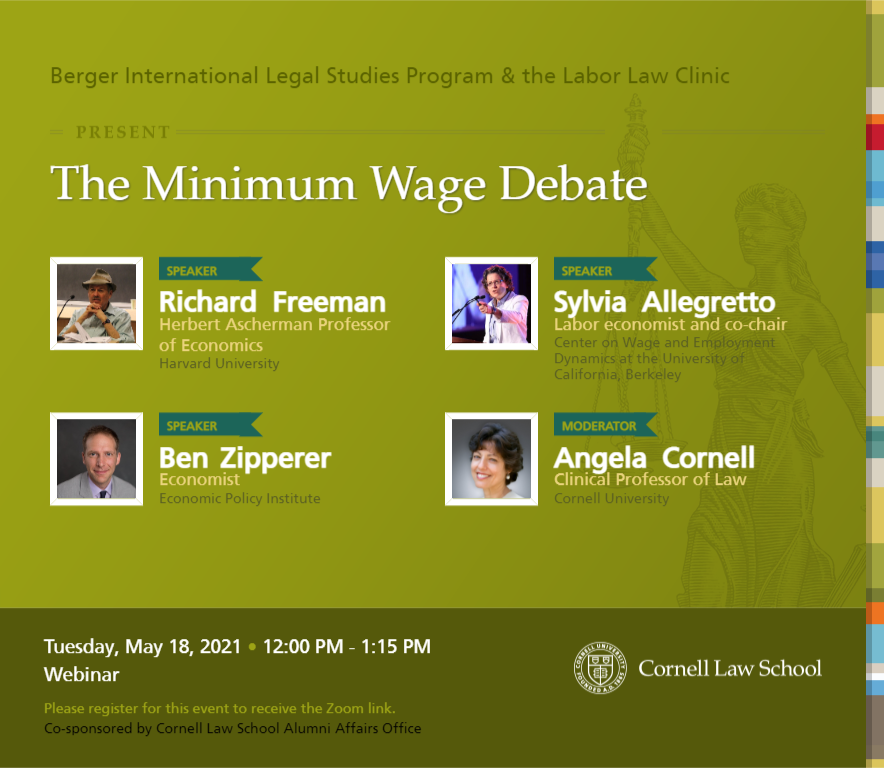
Greetings!
Please join us on Tuesday, May 18th, 2021 from 12 p.m. to 1:15 p.m. for a lively discussion of the federal minimum wage moderated by Cornell University’s Professor Angela Cornell and featuring panelists Richard Freeman, Sylvia Allegretto, and Ben Zipperer.
Co-sponsored by the Cornell Law School Alumni Affairs Office.
The federal minimum wage has been at $7.25 since 2009, and it’s the longest period in our history without an increase. Not indexed to inflation, the current rate produces the same purchasing power as 40 years ago. Gains in wages have gone to the top tier, while wages for most other American workers have been stagnant. Is it time for a $15.00 an hour minimum wage? Would there be adverse consequences? How have low wages impacted income inequality? Is the current wage contributing to the widening racial gap? Our nationally recognized experts will answer these questions and more.
About the panelists:
Richard Freeman holds the Herbert Ascherman Chair in Economics at Harvard University. He is currently serving as Faculty co-Director of the Labor and Worklife Program at the Harvard Law School, and is Co-Director of the Harvard Center for Green Buildings and Cities.
Sylvia Allegretto is a labor economist and co-chair of the Center on Wage and Employment Dynamics at the University of California, Berkeley. CWED is a research center housed at the Institute for Researcher on Labor and Employment. Dr. Allegretto received her Ph. D. in economics from the University of Colorado, Boulder and worked for several years at the Economic Policy Institute in Washington DC where she is currently a research associate
Ben Zipperer joined the Economic Policy Institute in 2016. His areas of expertise include the minimum wage, inequality, and low-wage labor markets. He has published research in The Quarterly Journal of Economics and the Industrial and Labor Relations Review and has been quoted in outlets such as The New York Times, The Washington Post, Bloomberg, and the BBC.
Fall 2020
Working on Human Rights in Uncertain Times
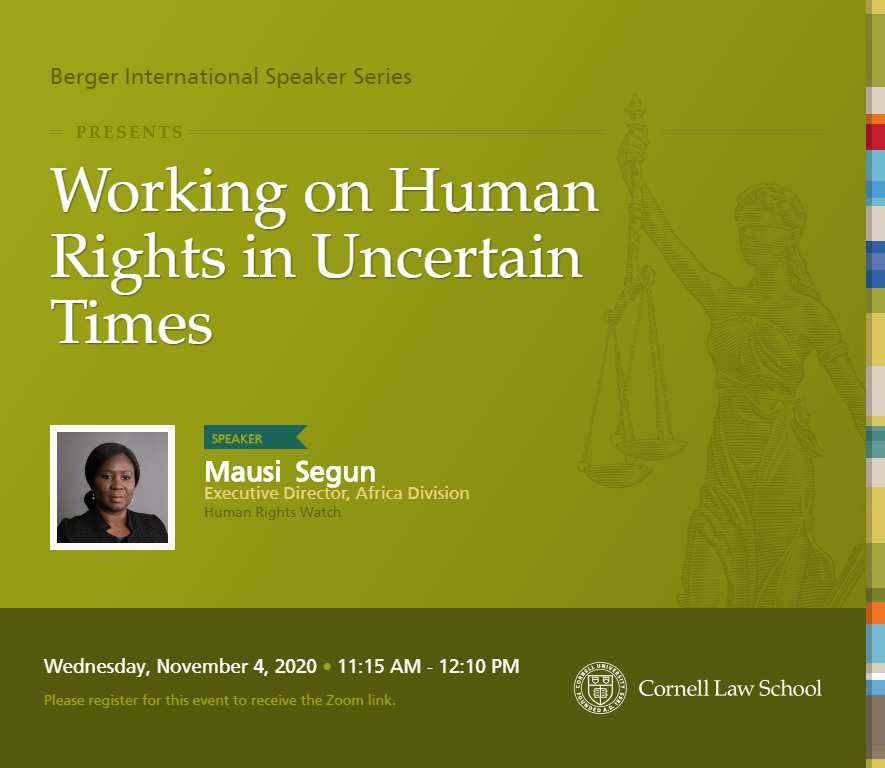
Speaker: Mausi Segun
Date and Time: November 4, 2020 11:15 AM – 12:10 PM
Mausi Segun is the Executive Director, Africa division at Human Rights Watch. With a law degree from Obafemi Awolowo University, Nigeria, and an LLM human rights law from the School of Oriental and African Studies (SOAS), University of London as a British Chevening scholar, Mausi has over 25 years of experience in legal and human rights practice.
She currently leads a team of 33 staff covering 25 countries in Sub-Saharan Africa on human rights issues around terrorism and counterterrorism, conflicts, cycles of communal violence, the humanitarian and refugee crises in Africa, sexual violence against women and girls, repression of journalists, activists, and political opposition as well as on natural resource exploitation and environmental rights.
She has written pieces and opinions for the New York Times, the Guardian and the Independent UK, Sunday Independent SA, the Huffington Post, Washington Post, MSNBC, and Salon. She is often featured and quoted on CNN, the BBC, Al Jazeera, Sky News, SABC, France 24 and other major news media. Mausi had previously worked at Nigeria’s Federal Ministry of Justice, and at the Nigerian National Human Rights Commission.
An Asylum and Refugee System in Tatters: Where Do We Go from Here?

Speaker: Bill Frelick
Date and Time: November 11, 2020 12:15 PM – 1:15 PM
Since 2005, Bill Frelick has served as the Refugee Rights director at Human Rights Watch, through which he monitors, investigates, and documents human rights abuses against refugees, asylum seekers, and internally displaced persons, and advocates for the rights of forcibly displaced persons worldwide. From 2002-2005, Mr. Frelick was the director of Amnesty International USA’s Refugee Program. He was also previously the director of the U.S. Committee for Refugees, which he served for 18 years (1984-2002). He has traveled to refugee sites throughout the world and is widely published. He was the editor of USCR’s annual World Refugee Survey and monthly Refugee Reports.
• Op-ed Pieces: New York Times; Wall Street Journal; Washington Post; Newsweek, Chicago Tribune; Los Angeles Times; Int’l Herald Tribune; St. Louis Post-Dispatch; Philadelphia Inquirer; Newsday; European Voice; Toronto Globe and Mail; Ottawa Citizen; Miami Herald; San Diego Union-Tribune; Washington Times; Houston Post; Atlanta Constitution; New Statesman; Huffington Post; The Guardian; Dhaka Tribune; Christian Science Monitor
• Academic/Law Journals: Georgetown Immigration Law Journal; Harvard International Review; Journal of Refugee Studies; Cornell International Law Journal; International Journal of Refugee Law; Interpreter Releases; Issue: A Journal of Opinion; Social Education; Migration: A European Journal of International Migration and Ethnic Relations; Immigration Newsletter; Bender’s Immigration Bulletin; Forced Migration Review.
• Reports and Issue Papers: “’Bangladesh Is Not My Country’ The Plight of Rohingya Refugees from Myanmar,” (2018);“Our Homes Are Not for Strangers” Mass Evictions of Syrian Refugees by Lebanese Municipalities (2018); “I Have No Idea Why They Sent Us Back” Jordanian Deportations and Expulsions of Syrian Refugees (2016); Containment Plan: Bulgaria’s Pushbacks and Detention of Syrian and Other Asylum Seekers and Migrants (2014), Jordan: Palestinian Refugees, Single Men, and Undocumented Unlawfully Forced Back to Syria (2013), Ad Hoc and Inadequate: Thailand’s Treatment of Refugees and Asylum Seekers (2012),Buffeted in the Borderland: The Treatment of Migrants and Asylum Seekers in Ukraine (2010); Pushed Back, Pushed Around: Italy’s Forced Return of Boat Migrants and Asylum Seekers, Libya’s Mistreatment of Migrants and Asylum Seekers (2009); Stuck in a Revolving Door: Iraqis and Other Asylum Seekers and Migrants at the Greek/Turkish Entrance to the European Union (2008); The Silent Treatment: Fleeing Iraq, Surviving in Jordan (2006); Inside Chechnya: Misery Fear, and Abuse (2001); Reversal of Fortune: Yugoslavia’s Refugee Crisis since the Ethnic Albanian Return to Kosovo (2000); The Wall of Denial: Internal Displacement in Turkey (1999); Barriers to Protection: Turkey’s Asylum Regulations (1996); Filling the Gap: Temporary Protected Status (1994); Faultlines of Nationality Conflict: Refugees and Displaced Persons from Armenia and Azerbaijan (1994); Last Ditch Options on Bosnia (1993); Yugoslavia Torn Asunder: Lessons for Protecting Refugees from Civil War (1992); Mass Exodus: Iraqi Refugees in Iran (1991); Running the Gauntlet: The Central American Journey Through Mexico (1991); Refugees at Our Border: The U.S. Response to Asylum Seekers (1989); The Back of the Hand: Bias and Restrictionism towards Central American Asylum Seekers in North America (1988).
• Field Work: Albania, Armenia; Azerbaijan/Nagorno-Karabakh; Bangladesh; Bosnia; Bulgaria; Canada; Croatia; Cuba/Guantánamo; Dominican Republic; Greece; Guatemala; Haiti; Honduras; Hungary; India; Iran; Iraq; Italy; Jordan; Kenya; Kuwait; Lebanon; Libya; Macedonia; Malta; Mexico; Montenegro; Myanmar; Nepal; Panama; Poland; Russia/Chechnya; Serbia/Kosovo; Slovakia; Slovenia; Thailand; Turkey; Ukraine; USA (migration detention centers in California, Pennsylvania, Texas, Virginia, and Florida); and Yemen.
Frelick taught in the Middle East from 1979-1983. He was co-coordinator of the Asian Center of Clergy and Laity Concerned 1976-1979. He has a B.A. from Oberlin College, Phi Beta Kappa, and an M.A. from Columbia University.
Berger Current Events Colloquium
The Berger Current Events Colloquium is a panel event on a topic relevant to current events that has some international or comparative focus.
35 Years After Bhopal: Lessons Learned?
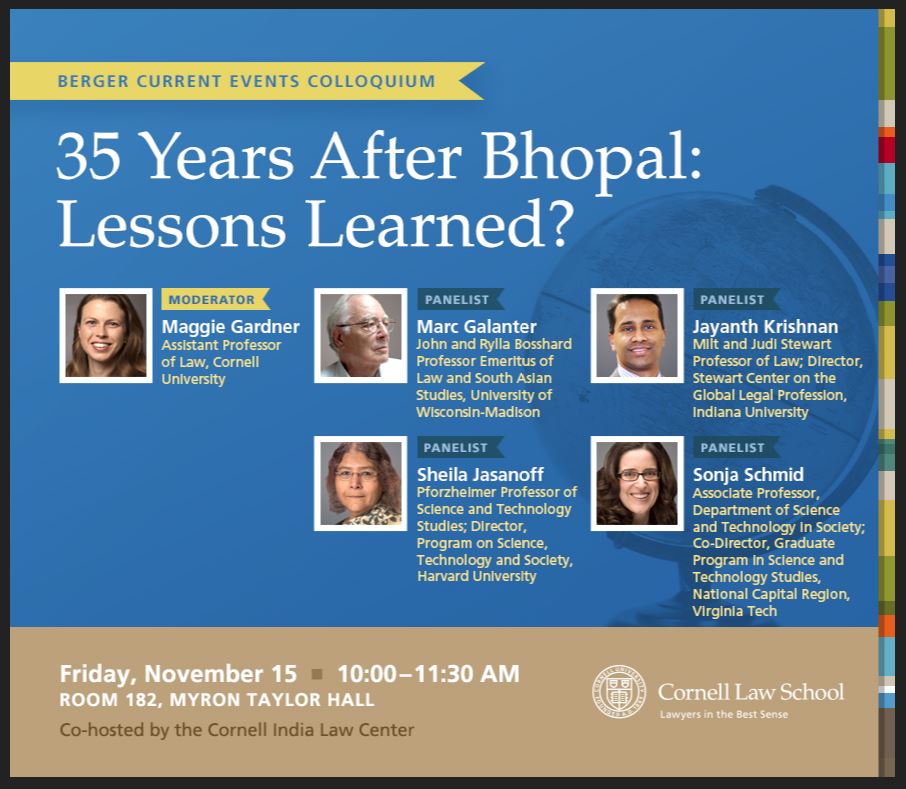
On the night of December 2, 1984, twenty-five tons of a highly lethal gas leaked from the Union Carbine India pesticide plant in Bhopal, India. The scale of the disaster was profound. Thousands of men, women, and children were killed instantly; tens of thousands were seriously injured; and hundreds of thousands continue to suffer from long-term environmental contamination. Efforts to assign liability, compensate victims, and remediate the physical environment stretched over the ensuing decades, yet have proved largely futile.
Have we learned anything from Bhopal? This panel discussion, open to the public, will bring together experts in Indian law, transnational law, and risk management to consider Bhopal’s legacy. Have we effectively prevented future Bhopals? Are we better equipped to respond to large-scale industrial disasters when they do occur? What more should be done?
Moderator: Maggie Gardner, Assistant Professor of Law, Cornell University
Panelists:
- Marc Galanter, John and Rylla Bosshard Professor Emeritus of Law and South Asian Studies, University of Wisconsin‑Madison
- Sheila Jasanoff, Pforzheimer Professor of Science and Technology Studies; Director, Program on Science, Technology and Society, Harvard University
- Jayanth Krishnan, Milt and Judi Stewart Professor of Law; Director, Stewart Center on the Global Legal Profession, Indiana University
- Sonja Schmid, Associate Professor, Department of Science and Technology and Society; Co-Director, Graduate Program in Science and Technology Studies, National Capital Region, Virginia Tech, Northern Virginia Center
Event Date: November 5, 2019
Renewing the New Deal: The Rise of the New Industrial Policy in America
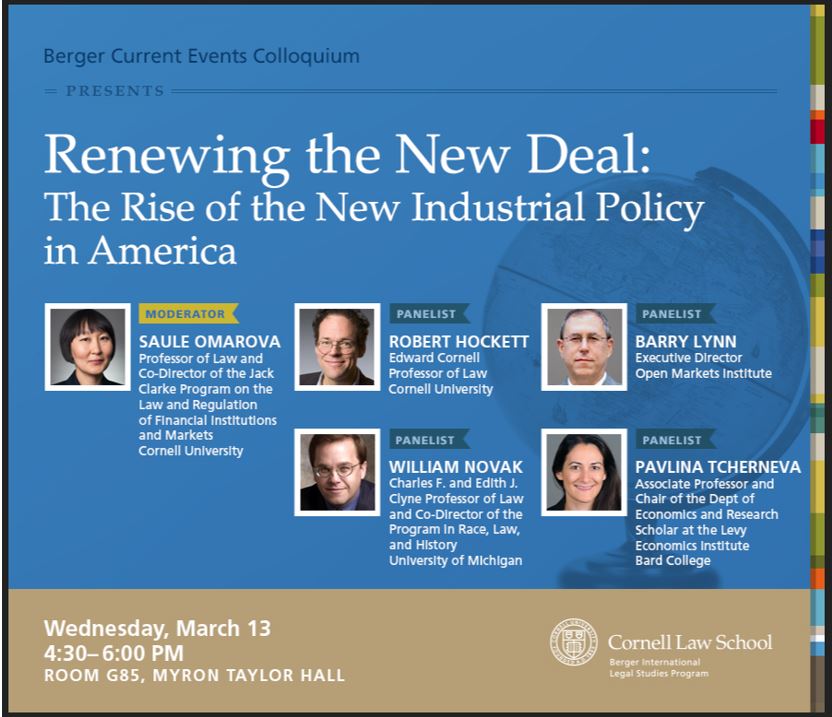
In recent times, the public policy discussion in America has been increasingly turning to the economic, political, and institutional legacy of the New Deal era. Some of this renewed interest is primarily rhetorical in character, as policymakers and ordinary people search for the right vocabulary to express both their present frustration with the decades of rising economic inequality, stagnant wages, erosion of the public safety net, and loss of confidence in the political process, and their hope for a better, more stable and just, future. Nearly a full century after the original New Deal transformed America’s economic and political life, we are facing a new set of economic, environmental, and political challenges that require a similarly bold and coordinated response.
What should this bold policy response – or a “New Industrial Policy” – look like? What specific problems would it target, and by what means? How will it help to rebuild the nation’s economy and to ensure a better, safer, more productive and more just, future for all Americans? Cornell Law School’s Berger Current Events Spring 2019 Colloquium will bring together a small group of prominent academics and policy experts to address these questions. From a variety of perspectives, the panelists will discuss some of the cutting-edge initiatives that are beginning to shape the contours of America’s emerging New Industrial Policy: the Green New Deal program, the Federal Job Guarantee proposal, and the rise of the “New Antitrust” movement. The purpose of the program is to share insights and to debate ideas on how best to move the broader agenda of socio-economic reform forward.
Moderator: Saule Omarova, Professor of Law and Co-Director of the Jack Clarke Program on the Law and Regulation of Financial Institutions and Markets, Cornell University
Panelists:
- Robert Hockett, Edward Cornell Professor of Law, Cornell University
- Barry Lynn, Executive Director, Open Markets Institute
- William Novak, Charles F. and Edith J. Clyne Professor of Law and Co-Director of the Program in Race, Law, and History, University of Michigan
- Pavlina Tcherneva, Associate Professor and Chair of the Dept of Economics and Research Scholar at the Levy Economics Institute, Bard College
Event Date: March 13, 2019
Climate Change Symposium
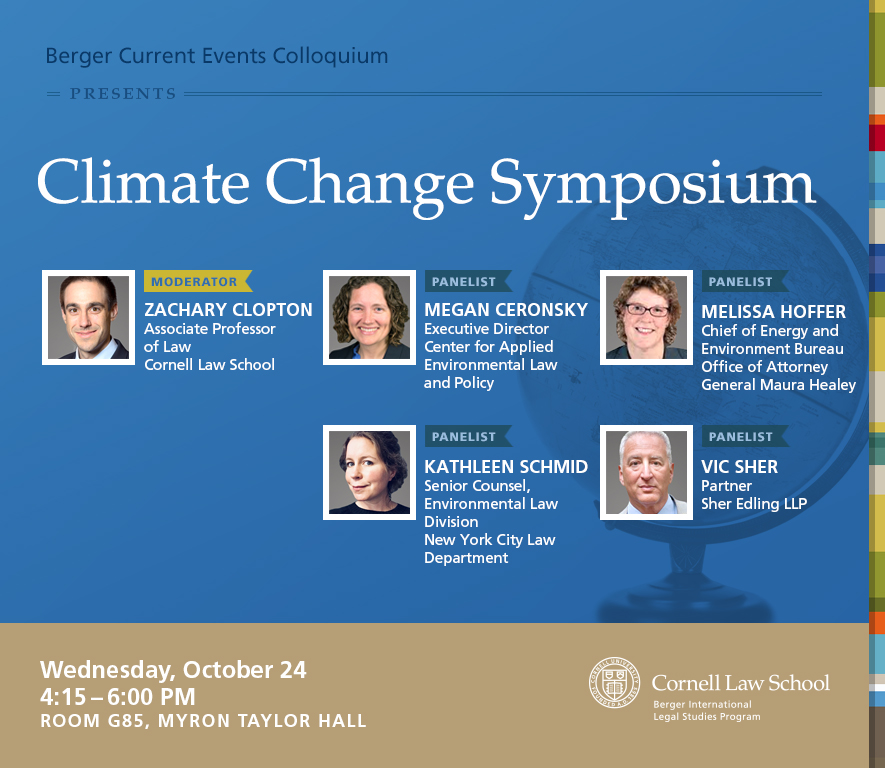
Climate change is a pressing problem of global importance. Responding to it requires the concerted efforts of scientists, engineers, policymakers, and citizens. Lawyers, too, have been deeply involved in the efforts to address global climate change. Cases have been filed in local, state, federal, foreign, international, and tribal courts. Plaintiffs have been individuals, NGOs, cities, states, tribes, and even children. Legal theories have been regulatory, statutory, constitutional, common law, and international law. What should we make of this tapestry of litigation? Does it matter who sues for what in which court? How does litigation relate to policymaking and to public opinion? This symposium hopes to consider these questions with input from lawyers working on climate litigation across its wide range of forms.
Moderator: Zachary Clopton, Associate Professor of Law, Cornell University
Panelists:
- Megan Ceronsky, Executive Director, Center for Applied Environmental Law and Policy
- Melissa Hoffer, Chief of Energy and Environment Bureau, Office of Attorney General Maura Healey, State of Massachusetts
- Kathleen Schmid, Senior Counsel, Environmental Law Division, New York City Law Department
- Vic Sher, Partner, Sher Edling LLP
Event Date: October 24, 2018


 icon and select "Add to Home Screen."
icon and select "Add to Home Screen."